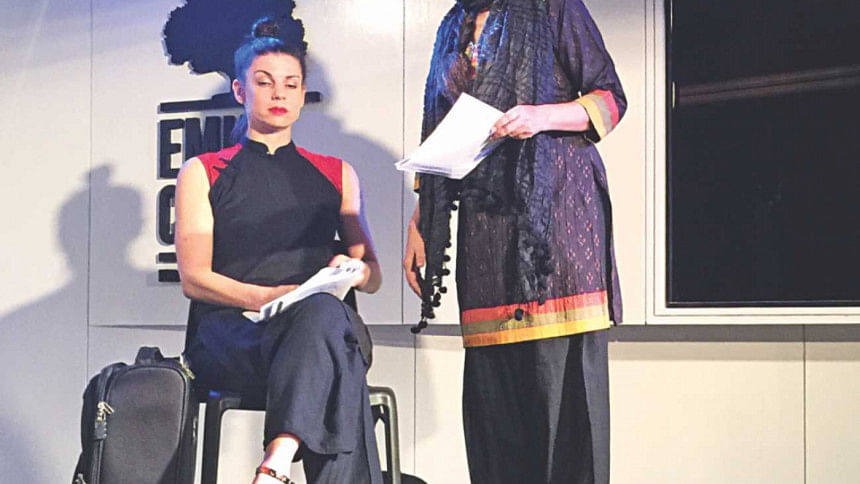OF LOCATIONS AND DISLOCATIONS

As a riposte to 'Brexit', award-winning British theatre director Marianne Elliott states, "I feel that art, somehow, has to be at the heart of what's happening now. We need to relay stories. Ever more needed in moments when there is an atmosphere of extreme right politics gaining ground." With this apparent death of cosmopolitanism in the background, British playwright Ben Musgrave's bi-lingual play about Bangladesh, scheduled to be performed in both English and Bangla, is just that artistic response which is the need of the day. It looks at 'homelands', beyond the boundaries of the 'nation'.
On April 17, 2017, a small but enthusiastic audience at the EMK Center in Dhanmandi was given a foretaste of the upcoming production through a rehearsed reading of the play "Mad Bees Riot in the Light" by a talented cast of Bangladeshi actors and, two visiting artistes from England - Imogen Bulter-Cole and Rosamunde Hutt. Hutt also directed the play through a ten-hour workshop exploration of the script.
The event was co-produced by Imogen, who has been part of a few Bangla-British initiatives since she first came to Dhaka in 2009 as a part of a BBC project. Later Imogen helped to take Nasiruddin Yusuf's play "Tempest" to the 'Globe' in 2012. She deserves credit for being a staunch friend of Bangladeshi creative arts.
An online blog about Ben Musgrave states that "much of his work is inspired by his international childhood" which he spent in England, Bangladesh and India. It is Bangladesh, though, where his parents came to work in a Christian Mission, which left a lasting impact on Ben. As a successful and well-awarded playwright, Musgrave has been courting Bangladesh in quite a few of his projects. 'The British Club', an audio-play about a Bangladeshi cop, was broadcast on BBC in 2012. And, even while working on "Mad Bees", Ben Musgrave has been commissioned by theatre pioneers 'Tara Arts' to write a new play about the Indigo Revolt in 1859-60. The revolt, also known as the 'Blue Mutiny', erupted in Bengal in response to terrible exploitation by British Indigo planters. To do this, Ben has toured 'indigo land' and extensively researched Dinobandhu Mitra's political play "Nildarpan".
Given this context, it is easier to understand the impetus behind Musgrave's play "Mad Bees" where the personal and the public intersect and interrogate through the portrayal of a tumultuous relationship between a mother, Carol Kite, and her estranged daughter, Rachel. Carol is, obviously, an expatriate woman from the West who is wedded to Bangladesh and it concomitant joys and woes. Rachel, much like Ben, spent a carefree childhood in rural Bangladesh, having made intense emotional bonds with people close and protective of Carol. At the crux of the mother-daughter conflict is Rachel's decision to return to a 'homeland' far from her mother's adopted country of residence. This immediately sets the stage for a discourse on 'locations' and 'dislocations' and makes us reflect about, as Homi Bhaba so eloquently states, "the need to think beyond narratives or originary and initial subjectivities and to focus on those moments or processes that are produced in the articulation of cultural differences". "Mad Bees" very effectively makes us question core issues related to our identities. It questions 'nation-ness' and 'nationality'. Are we of the land in which we are born? Or, do we belong to the land where we form life-long bonds of love and friendship? Add to this the narrative of a 'white-woman', Rachel's mother, dedicating her life to the upliftment of the destitute and the forgotten. Do we see here the overtones of Ben's own childhood spent with his Christian missionary parents, coming to the boondocks to spread the message of the gospel?
The audience was left to wonder about the finale, as the readings were from only a few excerpts of the play. It is to be hoped that such a fine initiative will look beyond clichéd messages and go the extra mile to speak up for the need for a constituency of global commonality.
All the actors deserve kudos for coming up with such a lively and innovative presentation. Veteran actor Naila Azad, as Carol Kite's world-weary legal representative, and Imogen, as the initially uptight daughter, neatly set the tone with their portrayals. Imogen was especially good in portraying Rachel's transition from edginess to certain tranquility, as childhood memories supersede antagonism. Others, too, played their roles effectively. Rosemunde Hutt is to be congratulated for the imaginative presentation. The audience was informed that eminent theatre activist Ishrat Nishat too
put in a lot of effort during the workshop.
We look forward to the final staging of the play.

 For all latest news, follow The Daily Star's Google News channel.
For all latest news, follow The Daily Star's Google News channel. 



Comments